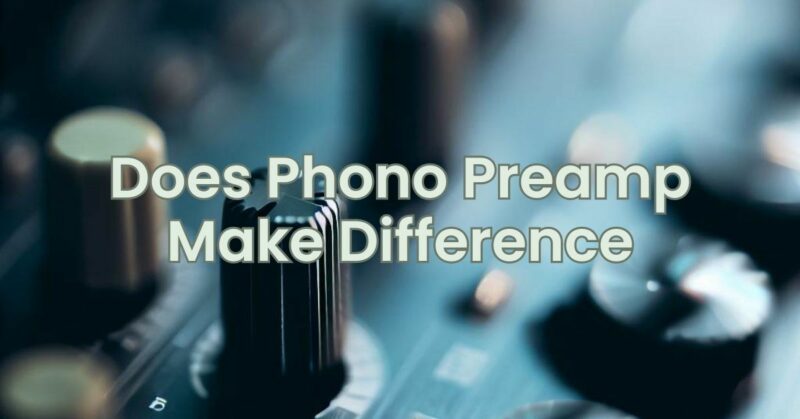Vinyl enthusiasts often debate the significance of various components in the vinyl playback chain, and one component that frequently sparks discussion is the phono preamp. A phono preamp, also known as a phono stage, is responsible for amplifying the low-level signal from a turntable’s cartridge and applying RIAA equalization. But does a phono preamp really make a noticeable difference in vinyl playback? In this article, we will delve into this question and explore the impact of a phono preamp on the overall sound quality of vinyl playback.
Understanding the Role of a Phono Preamp: Before discussing the difference a phono preamp can make, it’s crucial to understand its role in the vinyl playback chain. The output signal from a turntable’s cartridge is incredibly low in amplitude and requires amplification to reach line-level, which is compatible with other audio equipment. Additionally, the audio signal on vinyl records undergoes RIAA equalization during the mastering process, and the phono preamp applies the inverse RIAA equalization curve to restore the frequency response to its original form.
Sound Quality Considerations:
- Amplification Accuracy: A high-quality phono preamp can ensure accurate amplification of the delicate cartridge signal. A well-designed preamp will have low noise and distortion levels, preserving the nuances and dynamics of the music. Conversely, a poorly designed or inferior phono preamp may introduce unwanted noise, distortion, or coloration that can impact the overall sound quality.
- RIAA Equalization Precision: Applying the RIAA equalization curve accurately is crucial for faithful sound reproduction. A well-calibrated phono preamp will ensure that the frequency response of the vinyl playback matches the original recording, allowing the music to be experienced as the artist intended. A subpar phono preamp may introduce deviations in the equalization curve, affecting tonal balance and overall fidelity.
- Cartridge Matching: Different turntable cartridges have varying output characteristics, including impedance and sensitivity. A phono preamp that offers customizable cartridge loading options can optimize the impedance match between the cartridge and the preamp, resulting in improved signal transfer and enhanced sonic performance. This flexibility allows for better compatibility with different cartridges and ensures optimal sound reproduction.
Upgrading the Phono Preamp: If you’re using an entry-level turntable or an all-in-one system, the built-in phono preamp may be of average quality. In such cases, upgrading to a dedicated phono preamp can make a significant difference in sound quality. A higher-end phono preamp can provide better amplification, improved noise performance, more precise equalization, and greater flexibility for cartridge matching, resulting in a more detailed and engaging listening experience.
It’s important to note that the impact of a phono preamp will also depend on the overall quality of the audio system, including the turntable, cartridge, amplifier, and speakers. While a phono preamp can enhance the performance of the vinyl playback chain, its benefits may be more apparent in systems that already possess a certain level of fidelity.
In conclusion, a phono preamp does make a difference in vinyl playback, primarily in terms of amplification accuracy, RIAA equalization precision, and cartridge matching capabilities. A high-quality phono preamp can improve the overall sound quality of your vinyl playback system, offering cleaner amplification, more faithful equalization, and better compatibility with various cartridges. However, it’s important to consider the overall quality of your audio system and components to fully appreciate the impact of a phono preamp. If you’re seeking to enhance your vinyl listening experience, upgrading to a dedicated phono preamp is a worthwhile consideration.


